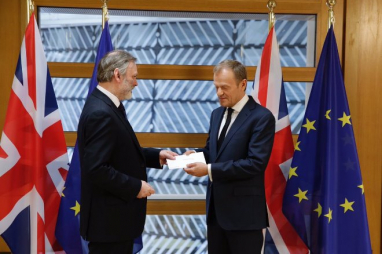- adidas superstar heren groen shoes sale india 2018
- Barron Trump’s Height Is Taller Than Melania, Donald & Many Teen Boys – Fonjep News
- Кросівки nike air jordan 1 low 'pine green' Raging Bull Toro Bravo 2021 DD0587 - SBD - 600 Release Date - AIR introducing JORDAN
- Пилинг - диски с bha и pha - кислотами needly daily toner pad 1шт — цена 50 грн в каталоге Скрабы для лица ✓ Купить товары для красоты и здоровья по доступной цене на Шафе , Украина #112548157
- nike air jordan 1 mid outlet
- air jordan 1 mid chicago 2020 554724 173
- eastbay restock large amount air jordans
- kids air jordan
- air jordan xxxv cq4227 004
- nike air force 1 boot cordura black wheat university gold do6702 001
- Home
- News and analysis
- Info hubs
- Events
- Video
- Case Studies
- About us
- Magazine
- Advertising
Produced for the industry by the Association for Consultancy and Engineering
News
Business reacts with concern following the signing of Article 50

As the prime minister Theresa May formally triggers article 50, starting the process taking the UK out of the European Union, the press and media in the UK and across Europe are speculating what this will mean for the UK, its economy, business prospects and the political landscape in the months and years ahead.
The construction and infrastructure sector, which on balance wanted to see the UK remain in the EU, expressed a number of concerns today now that the formal process of exiting has been triggered.
Nelson Ogunshakin, chief executive of the Association for Consultancy and Engineering, commented: “The government must now begin to put into practice all that it has promised since the EU referendum result was announced on Friday 24 June last year. The two years we now have until we leave the EU must not be wasted and we have to ensure transitional arrangements that are as beneficial to the UK as possible.
“The consultancy and engineering sector must continue to be able to trade easily across European borders and the UK must remain an attractive place to come and settle, to receive an education, as well as to work. With the ambitious infrastructure agenda the government has set out, it is vital that the UK continues to be an attractive place to invest and that we avoid worsening an already acute skills shortage.
“ACE and its members will be watching the negotiations carefully and will want to be satisfied that any deal signed in two years will benefit the UK. This will be the legacy of Theresa May and her government.”
Nick Roberts, Atkins’ CEO for UK and Europe, said: “As we face into this time of change, it’s vital that we remain competitive and relevant in the post-Brexit world. As an industry and through the likes of the ICE’s Brexit leadership group, we’ve already done a lot of work to identify our top priorities for the negotiations. We need to continue to press our case strongly, monitor developments closely and remain agile to ensure we mitigate risks and position ourselves well to take advantage of opportunities that arise.”
Matthew Farrow, executive director of the Environmental Industries Commission (EIC), said: “EIC and its members will be focused on two issues. First, we must make sure that leaving the EU does not mean a loss of environmental standards. Second, because environmental policy is all about the detail, we need to ensure that environmental policies and mechanisms works effectively in the new context of Britain being outside EU law and institutions.
“This will involve painstaking work on a case-by-case basis. EIC's members have been working day-in and day-out with EU green regulations for decades, and are well-placed to work with government, the Environment Agency and other stakeholders to ensure this happens. Lastly, we should remember that environmental technology and services is a UK success story, with innovation and expertise respected around the world. The sector should have a prominent role in the industrial strategy as we develop a productive post-Brexit economy.”
Patrick Flaherty, chief executive UK and Ireland at AECOM, expressed concern about the availability of labour and cost rises. “Now that Article 50 has been triggered, industry still faces a minimum of two years of continued uncertainty, particularly around issues such as labour availability and construction material costs,” he said.
“Focus must remain on progressing the UK’s ambitious infrastructure pipeline to give confidence to the market in the intervening period. The delivery of large-scale domestic schemes such as HS2, Crossrail 2, a third runway at Heathrow and the Northern Powerhouse programme are critical to the country’s ability to compete on a global stage,” said Flaherty.
As an organisation that employs a large number of international citizens across its UK operations, Flaherty said that AECOM was concerned to ensure that there was no negative effect on them from Brexit. “Safeguarding the rights of EU nationals already in the UK to remain here is important for the wellbeing of our employees, the future success of AECOM and the prosperity of the wider built environment sector,” he said.
“As a global business, we have unparalleled access to highly-skilled expertise from across Europe and the rest of the world. We serve clients all over the globe from our offices in the UK. For us and for many global businesses with UK operations, guaranteeing the movement of people across borders will be essential for the delivery of large-scale and complex infrastructure projects,” Flaherty said.
Mike Haigh, ACE chairman and managing director of Mott MacDonald Group, said: “UK businesses and the country as a whole now faces a period of uncertainty and challenge as the negotiations to agree a settlement on the terms of the UK’s withdrawal from the EU play out. It is in everyone’s interests for the government to keep that uncertainty to a minimum. Many consultancy and engineering firms will be concerned to ensure that the rights of EU nationals already in the UK to remain here are safeguarded and we would welcome an early resolution of this issue.
"Given the ambitious plans the government has for infrastructure development going forward, our industry needs the confidence that it will have access to the labour force it needs to deliver those plans. At ACE, we look forward to working with government departments to ensure that our industry’s interests are best served and also we will be working in partnership with other industry bodies to ensure that we all maintain a consistent message on the needs of the construction and infrastructure sector.”
Marc Davies, divisional director, planning and advisory services at WYG, said: "Triggering Article 50 makes the countdown to leaving the EU official, but it does not alleviate the current uncertainty about its impact. Of course, we will be following the political negotiations closely over the next two years and lobbying where appropriate to ensure a focus on securing attractive trade deals with Europe. In the meantime, it is important that we remain steadfast in our commitment to improving productivity and infrastructure across the north of England to promote economic growth. The importance of university research to the northern economy and scale of current funding from the EU make this an area of key consideration too. More than ever, we also need to improve our international connectivity, by supporting ongoing investment in the growth of airports and ports in the region, both for doing trade and attracting inward investment."
Representing the wider business community, Stephen Martin, director general of the Institute of Directors, said: “Now the real work begins. Ministers must roll up their sleeves and focus on getting a good deal for Britain in the tough negotiations ahead. Success means listening to business on the vital priorities of maintaining tariff-free trade, minimising customs red-tape and keeping the bureaucratic hurdles to bringing in necessary skills as low as possible. Business leaders are optimists by nature, but they are now facing substantial change, with the UK leaving both the EU Single Market and the Customs Union.
“Maintaining confidence over the next few years will be key, and that means the government must prioritise a smooth Brexit, with the terms of the withdrawal deal and our new trading arrangement both agreed before we walk through the exit door. We’ve felt a lot of heat in the months since the referendum, now we need to see the light showing us the way to a good Brexit,” said Martin.





